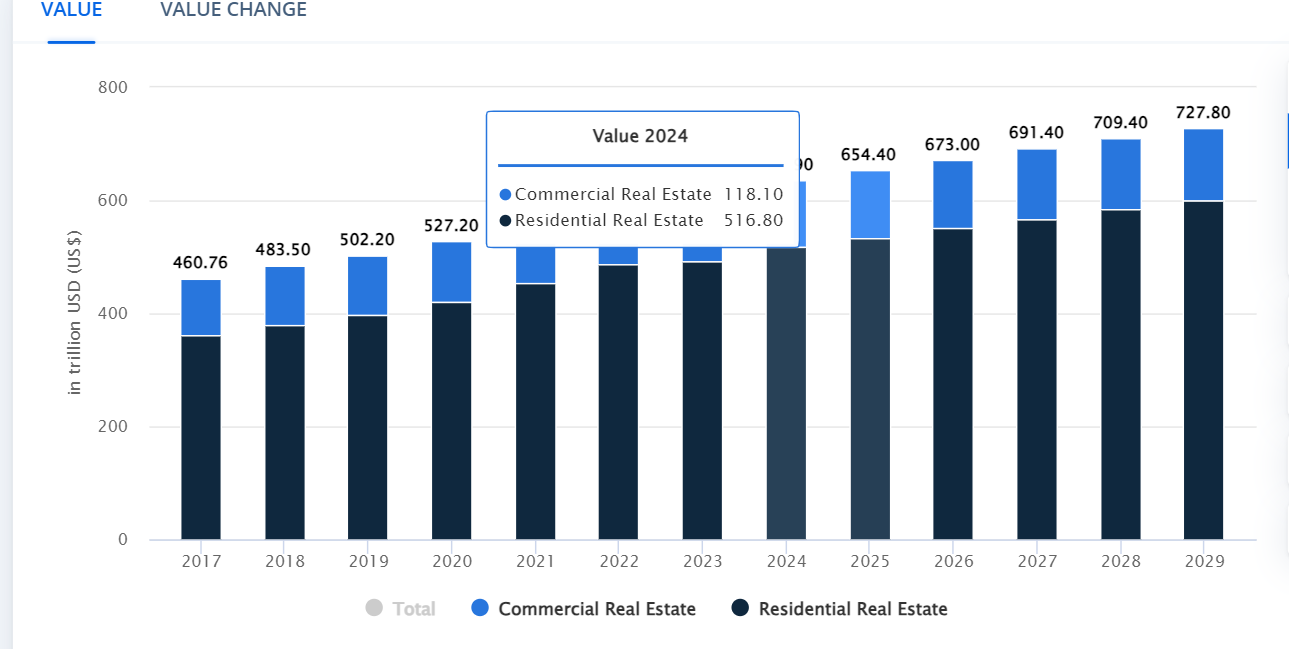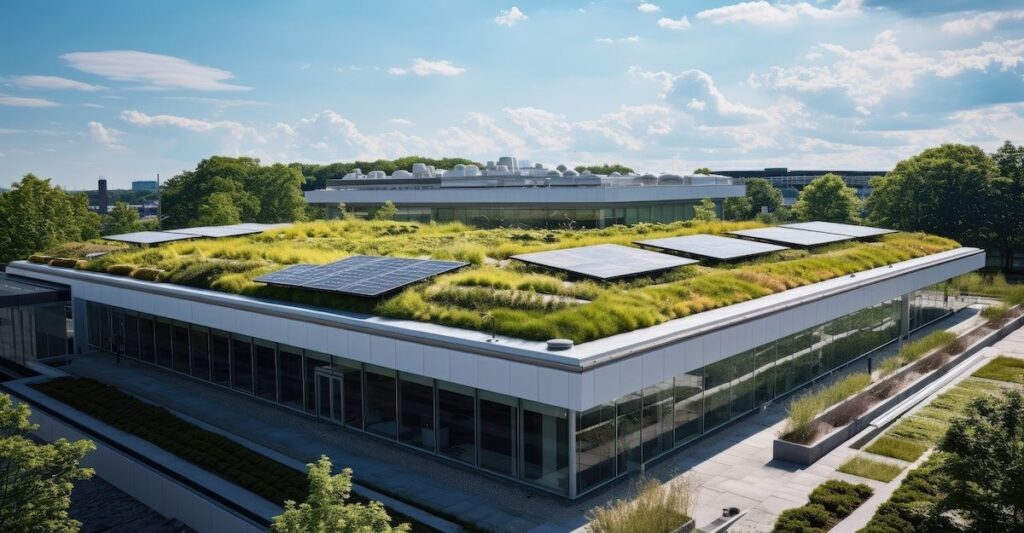PropTech trends has totally changed the real estate industry, which was earlier known for not taking up newer technologies quickly.
The term PropTech refers to property technology and deals with applying information technology and platform economics to real estate markets.
Solutions provided by PropTech reshape every nook and corner of this industry-from the ways properties are bought and sold or rented to their management, financing, and maintenance.
PropTech in 2025 and beyond is going to make an even greater impact as the industry adjusts to the new landscapes of technological advancement and changing consumer demand.
With PropTech startups leading the game, innovation in real estate technology addresses inefficiencies in ways that create new opportunities along the spectrum of real estate-from AI to blockchain, the landscape changes fast.
What’s PropTech and Its Evolution?
The term PropTech is broad and covers a wide array of technologies tailored to optimize the way the real estate industry works.
From digital platforms where people buy houses online, even advanced analytics predict prices. Thus, PropTech is playing an integral role in modernizing the real estate sector.
The real estate industry was one of the late adopters of technological changes. From transactions, appraisals, and managing property, most areas of the business were done manually until recently.
This is, however, with the rising explosion of digital solutions that have been created in the last decade, which made such innovations more accessible, and the growth of PropTech startups also contributed to that.
In a study by the Oxford Future of Real Estate Initiative, it is indicated that real estate technology investments were surpassing $10 billion in 2022. This amount is growing further, which means that PropTech is not a bubble but very much the reason for growth in the future.

Top 10+ PropTech Trends in 2024
PropTech stands at the core of modern real estate developments. In 2024, more than 20 trends in the field will shape the face of real estate from AI-powered platforms to the rise of the smart city.
These PropTech trends unlock long-intractable problems and open opportunities for professionals, investors, and consumers alike.
| PropTech Trend | Technology Focus | Key Features | Benefits | Real-World Example | Target Audience |
|---|---|---|---|---|---|
| AI-Powered Real Estate Platforms | AI, Predictive Analytics | Data-driven property search, personalized experiences | Improved property search, smarter investment decisions | Zillow, Reonomy | Real estate investors, homebuyers |
| Digitalization of Real Estate Investing | Crowdfunding, Blockchain | Fractional ownership, real estate tokens | Increased access to property investments | Fundrise, RealtyMogul | Retail investors, new investors |
| Smart Buildings and Sustainability | IoT, Energy Efficiency | Smart sensors, energy management systems | Reduced carbon footprint, energy cost savings | Wework, View | Property managers, commercial landlords |
| Frictionless Renting & Property Management | Automation, AI | Online rent payments, automated lease renewals | Streamlined rental processes, reduced administrative work | AppFolio, Buildium | Tenants, landlords |
| Tech-Enabled Real Estate Brokerages | AI, Virtual Agents | AI chatbots, automated client management | Enhanced client experiences, 24/7 service availability | Compass, Redfin | Real estate agents, brokers |
| 3D Home Tours and Virtual Showcases | 3D, VR/AR | Virtual home tours, AR for home design | Immersive property viewing, enhanced customer engagement | Matterport, Zillow 3D Home | Homebuyers, real estate marketers |
| PropTech Startups Focused on Sustainability | Smart City Tech, Green Building | Green construction materials, smart energy grids | Sustainable real estate, reduced energy usage | BlocPower, Carbon Lighthouse | City planners, green developers |
| Blockchain and Smart Contracts | Blockchain, Smart Contracts | Decentralized property ledgers, automated contracts | Transparent and secure transactions, reduced fraud risk | Propy, Ubitquity | Real estate buyers, sellers |
| PropTech Solutions for Affordable Housing | Modular Housing, Co-living Spaces | 3D printing, prefabricated housing | Reduced construction costs, faster build times | The Collective, Factory OS | Urban developers, affordable housing providers |
| Digital Twins in Real Estate | Digital Twins, Predictive Analytics | Virtual replica of physical buildings, real-time monitoring | Improved building maintenance, reduced downtime | Willow, Siemens Digital Twin | Property managers, developers |
| Improving Tenant Experience | Tenant Portals, Automation | Online service requests, tenant engagement systems | Increased tenant satisfaction, higher retention | TenantCloud, AppFolio | Property managers, tenants |
Herein, we delve deep into the top PropTech trends to watch in 2024:
1. AI-driven Real Estate Platforms and Predictive Analytics
Artificial intelligence continues to dominate the PropTech ecosystem through the improvement in the property search experience and enabling better market predictions.
AI-driven platforms such as Zillow and Redfin apply machine learning towards fine-tuning property recommendations closer to user preferences, which helps improve customer satisfaction.
Predictive Analytics in Real Estate Investment
Predictive analytics tools analyze big datasets, such as historical property prices and behavior of buyers, in combination with economic indicators to predict market trends. Such tools provide invaluable insight for investors to make smarter, data-driven decisions.
Companies like HouseCanary and Reonomy are using AI to predict the values of real estate and forecast opportunities for investment.
Example: According to Statista, predictive analytics in real estate have recorded a 15-20% higher ROI for investors using such tools compared to traditional methods.

2. Digitalization and Democratization of Real Estate Investing
One of the most disruptive PropTech trends has to be the digitization of real estate investment. Gone are the days of requiring massive capital to join the real estate market, thanks to platforms created by Fundrise and RealtyMogul.
These platforms facilitate fractional ownership in properties, meaning one can buy smaller bits of properties and enjoy all the benefits that come with real estate investment, with a fraction of the cost with no traditional barrier to entry.
Crowdfunding and Fractional Ownership Platforms
Crowdfunding has changed the way people think about real estate investing, making it more accessible to the common man. Startups like Roofstock use PropTech to permit investors to purchase fractional ownership in rental properties, sharing the investment and profit.
This is likely to increase by 2024 as more and more investors seek low-risk ways to diversify their portfolios.
Fact: According to PwC, the global crowdfunding market in real estate will grow up to a value of $13.9 billion by 2026, due to democratization in property ownership.
3. Smart Buildings and PropTech about Sustainability
Therefore, with the integration of IoT devices into real estate in 2024, the intelligent building will take over where everything is automated, right from energy usage to the security system.
These technologies are but improving operational efficiency and further promote sustainability through the reduction of the carbon footprint from buildings.
Energy-Efficient Buildings
While the consciousness towards sustainability is at an all-time high, energy-efficient building construction is way ahead in the race, and this is being taken good care of by the PropTech startups.
View and Enertiv are two of many companies using IoT sensors and smart building technologies that monitor energy consumption and optimization. This ingenuity cuts down on operational costs and helps meet the demand for more eco-friendly buildings.
Example: Smart windows from View can automatically tint according to the amount of sunlight; this reduces the need for artificial lighting and cuts energy costs up to 20%.

Green Building Certifications on the Rise
Green building certification, such as LEED, is on the rise in 2024. The innovations that have come along with PropTech have helped developers pursue such standards more effectively than ever before.
As a case in point, the deployment of advanced sensors with AI for the optimization of energy usage in commercial properties in pursuit of LEED certification by a startup called Carbon Lighthouse.
Fact: The U.S. Green Building Council estimates that LEED-certified buildings use 25% less energy and 11% less water, thus creating demand for sustainable property solutions.
4. Seamless Renting and Management with Automation in Properties
PropTech is making the rental process smoother than ever. From automated lease agreements to maintenance requests, all aspects are changing due to digital platforms that manage properties. Automation in 2024 means easier navigation at every touchpoint in the rental process for landlords and tenants alike.
Automated Lease Agreements and Payments
Facilities like Avail and Buildium offer an all-in-one property management system with automation in lease agreements, rent payments, and even maintenance requests.
This automation will not only reduce paperwork but will also hasten the processes that are used by property managers and landlords to manage their properties.
AI-Driven Property Maintenance
AI also fuels predictive maintenance in rental properties. Startups like Zyyo offer solutions that monitor property conditions in real time and predict when repairs are needed.
This, in turn, enables pro-active property management that reduces time spent, decreases costs involved, and ensures tenant satisfaction.
Example: Zyyo says properties that use its predictive maintenance technology reduce their emergency repair costs by 30%.
5. Tech-Enabled Real Estate Brokerages and Virtual Agents
In 2024, the role of the real estate agent is set to change fast with the rise of AI and automation. Technology-enabled brokerages will make increasing usage of AI that provides for virtual real estate services-property tours, negotiations over contracts-with no physical contact between individuals.
Emergence of Virtual Real Estate Brokerages
Brokerages such as Redfin and Compass have begun integrating AI-driven tools that will make seamless the property transaction.
These platforms engage virtual agents for buyers and sellers in the process of home buying, from property searches down to closing. In decreasing human dependencies on agents, brokerages decrease costs while improving the customer experience.
Fact:NAR projects that 70% of homebuyers in 2024 will engage some form of virtual agent during their property search. This shows a movement toward digital-first real estate services.
6. 3D Home Tours and Virtual Property Showcases
Virtual tours have become expected in 2024, especially for those buyers who wish to buy homes without being physically present at the location of purchase.
3D home tours give an immersive experience whereby a potential buyer can look into the details of properties as if they were present there.
Virtual Staging and Augmented Reality
Beyond virtual tours, augmented reality is disrupting a new way of viewing home staging and marketing. AR can help buyers conceive how a property might look with different furniture or renovations, hence helping in making a more prudent decision.
t is at this point that platforms such as Matterport and EyeSpy360 are leading the innovation curve, hence offering customizable virtual tours that increase buyer engagement.
For example, Matterport reported that homes featuring 3D tours spend 31% less time on the market and receive more offers than homes without virtual tours.

7. Rise of PropTech Start-ups Driven by Sustainability
The growth of awareness for climate change and environmental responsibility asks for innovative ways that make PropTech startups put sustainability at the forefront.
Using technology, these firms have been working on developing solutions that would not only reduce carbon footprints but also make lives greener in helping to build smart cities.
Smart City Technology
PropTech innovations are being incorporated into smart cities for better infrastructure, energy management, and effective waste reduction; making urban living more feasible.
Cities like Barcelona and Singapore have been open to these technologies in a bid to build sustainable urban environments that cut down pollution and improve the general quality of living.
Fact: According to McKinsey, smart city technologies may decrease up to 15% of global greenhouse gas emissions by 2030-an indication of the huge environmental impact the innovations have.

8. Blockchain and Smart Contracts in Property Transactions
Blockchain technology is rapidly revolutionizing real estate transactions, bringing about immense changes in the area of transparency, efficiency, and security.
Smart contracts allow faster and more secure property transactions without any brokerage involved because it is self-executing, with the terms directly written in code.
The blockchain provides a decentralized ledger for keeping land records in such a way that it is tamper-proof and completely transparent, hence curbing fraud and other administrative malpractices.
Efficiency of Transactions: Smart contracts are automated; when the conditions set within them are met, buyers and sellers can execute a property transaction straight away with minimum or no involvement of third-party intermediaries.
Example: In 2024, startups like Propy and Ubitquity use blockchain for property deals, reducing real estate transaction times by up to 40%.
Read More: Blockchain in Real Estate: How Smart Contracts Are Revolutionizing Property Transactions
9. PropTech Solutions for Affordable Housing
The crisis of affordable housing is still a huge issue, yet PropTech startups are tackling it head-on by developing innovative solutions that make affordable housing more accessible to people.
Modular and Prefabricated Housing: 3D printing and modular construction make the building of homes faster and cheaper.
With this speed and cost savings, scalable solutions to housing shortages become available.
Co-living and Micro-apartments: Co-Liv and The Collective are just two of the PropTech platforms enabling co-living spaces and micro-apartments as ways of optimizing urban housing and delivering affordable options to younger professionals in particular.
Fact: The Urban Land Institute estimated that modular construction could reduce building costs by 20-30%, thus helping to solve affordability problems.
10. The Rise of Digital Twins in Real Estate
A digital twin is a virtual model of a physical building that can be simulated under real-world conditions for maintenance management and to predict future problems.
Coming in 2024, digital twins will become popular because they help maximize the performance of buildings and simplify property management.
Building Management: With a digital twin, one can visualize a property whereby building managers have the facility to monitor at any instant of time energy use, HVAC systems, and even foot traffic for better efficiency.
Predictive Maintenance: Through digital twins, they can calculate in advance when their systems are likely to fail, reducing downtime and expensive repairs.
Example: Willow is one of the leading PropTech companies that uses digital twins to help property managers monitor performance and optimize operational processes in buildings.
11. How PropTech Can Help Enhance Tenant Experience
2024 continues to put a yet sharper focus on the enhancement of tenant experience, both in residential and commercial estates.
PropTech platforms are now offering solutions to increase tenant satisfaction, reduce turnover rates, and enhance efficiency in the management of properties.
Tenant Portals: The AppFolio platform enables tenants to pay rent digitally and make maintenance requests with seamless communication to landlords.
 Image Source: VTS
Image Source: VTS
Custom Amenities: A more recent development in PropTech is a hyper-personalization of amenities, depending on what tenants want and do not want. This might involve providing concierge services or making the gym equipment smart.
In this way, PropTechs improve the leasing experience.
Fact: According to JLL, properties that employ state-of-the-art tenant experience technologies can realize an increase as great as 15% in tenant retention.
Author’s Note: Insights on the Next Big PropTech Trends to Watch in 2025 and Beyond
Looking ahead, key PropTech trends like AI-powered platforms, blockchain for secure transactions, and sustainability-driven startups will drive the industry’s evolution. AI will offer personalized recommendations and predictive analytics, while blockchain will enable faster, more transparent international transactions.
Additionally, sustainable smart city technologies will become more prominent, leading to greener developments and smarter urban planning. Startups that innovate in AI, blockchain, and sustainability will shape the future of PropTech.
PropTech will continue to disrupt and redefine real estate, making it more efficient, connected, and sustainable in the years ahead.
Conclusion: PropTech’s Role in the Future of Real Estate
PropTech modernizes residential and commercial real estate alike.
AI-driven platforms for residential sectors provide immense buyer and seller experiences: increased transparency due to 3D tours and virtual open houses.
Innovations in commercial real estate involve smart buildings and blockchain, among many other uses, greatly improving property management and transactions due to enhanced sustainability, security, and cost-effectiveness.
Long-term, it will be forcing the real estate industry into a future of data-driven decision-making, remote experiences, and environmentally conscious development.
As these technologies continue to change from year to year, they will further shape how properties are bought, sold, and managed, completely changing the core landscape of operations within the real estate sector.
FAQ’s on the PropTech trends
1. What are the PropTech trends in 2024?
Key trends in 2024 include AI-powered platforms, 3D home tours, blockchain for real estate transactions, smart buildings, and sustainability-focused innovations like IoT for energy efficiency.
2. What advancements has PropTech made recently?
PropTech has advanced in areas like predictive analytics, virtual reality for property tours, automated property management systems, and blockchain for secure transactions.
3. What is the meaning of PropTech?
PropTech, short for Property Technology, refers to digital tools and innovations that transform the real estate industry, improving efficiency in buying, selling, and managing properties.
4. What is the outlook for the PropTech industry in 2024?
The PropTech industry is expected to grow significantly, driven by AI integration, sustainability initiatives, and digital platforms that make real estate transactions faster and more accessible.
5. What are the risks of PropTech adoption?
Risks include data security concerns, high initial costs of implementation, and resistance from traditional real estate firms to adopt new technologies.
6. Who invests in PropTech?
Venture capitalists, real estate investment firms, and technology corporations are the primary investors in PropTech startups, seeking to capitalize on real estate’s digital transformation.
7. What is the purpose of PropTech?
The main goal of PropTech is to enhance efficiency, transparency, and customer experience in real estate through technology-driven innovations like automation, AI, and blockchain.
8. What are the market segmentations in PropTech?
PropTech is segmented into areas such as property management, construction tech, smart buildings, real estate transactions, and real estate investment platforms.
9. Why invest in PropTech?
Investing in PropTech offers opportunities to benefit from increased market efficiencies, cost reductions, and the growing demand for digital solutions in real estate.
10. What are the issues with PropTech?
Challenges in PropTech include cybersecurity risks, regulatory hurdles, technology adoption barriers, and concerns over job displacement in traditional real estate roles.
Please Also Read: Luxury VR Properties You Won’t Believe Exist in 2024/2025 – Explore Virtual Mansions from Your Couch!






